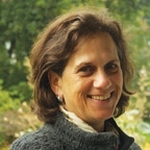 (Host) Author, essayist and educator Deborah Lee Luskin is especially
(Host) Author, essayist and educator Deborah Lee Luskin is especially
looking forward to the Brattleboro Literary Festival this year, because
one of her former writing students will be there with his first book.
(Luskin)
Three years ago, I received an extraordinary letter from Daniel
Chamovitz, a man who’d been a student of mine at Columbia University, in
1982.
Now a professor of biology at Tel Aviv University, Danny
teaches a class called "Scientific Writing in English for Ph.D.
Students." When one of his students asked him how he learned to write,
he remembered being assigned to my "Introduction to Freshman
Composition," a remedial writing course designed to boost the writing
ability of bright but inarticulate young men.
(Columbia was still an all-male college back then.)
As
Danny remembers the situation, he was perhaps the only one in the class
who wasn’t on a varsity team. In fact, he was sure he’d been put in the
class by mistake. He says that I told him, "Let’s see how you do on
your first composition."
In his letter, he writes, " After
getting a C- on what was in retrospect a very pitiful piece of work, I
settled in for the whole semester of your class (and then another
semester of the regular Freshman Comp).
That C- was a formative
moment in my career, as it made me take a deep breath and admit that
maybe I didn’t really know what good writing was.
Your guidance, coupled with 750 words a week, and the requisite journal-keeping, was invaluable in my developing my own style."
Danny credits his success as a scientist as much to his writing ability as to any scientific achievements.
His
letter continues, "I find it rather funny that having been relegated to
your remedial class, I now teach others the basic structure of
composition, where my first challenge is convincing Ph.D. students that
their problem isn’t "writing in English," but constructing a coherent
paragraph in any language!"
I don’t know the exact nature of
Danny’s research into plant biology or how many languages Danny now
speaks, but I know he can write informative and entertaining prose in
English.
He’s authored the book, What A Plant Knows: A Field Guide to the Senses in Your Garden and Beyond.
What a Plant Knows is one of those gems of non-fiction, a book that explains cutting-edge science to the general public.
In
the course of detailing how a plant perceives light, odor, sound, and
touch, Chamovitz also recounts the intellectual history of plant
science, revealing how human thought about biology has evolved. He
explains how plant biology has enlarged the human understanding of cell
function, knowledge that has potential human benefits, including
medicine, agriculture and environmental science.
Perhaps even
more than the good writing and the interesting science, What a Plant
Knows reveals a truly curious and generous mind, which makes the book
accessible and enjoyable for a non-scientist, like myself.
Lucky for us, then, that Danny Chamovitz will be one of the authors at this year’s Brattleboro Literary Festival.
If Danny were still in my class, I’d give him an A-plus.